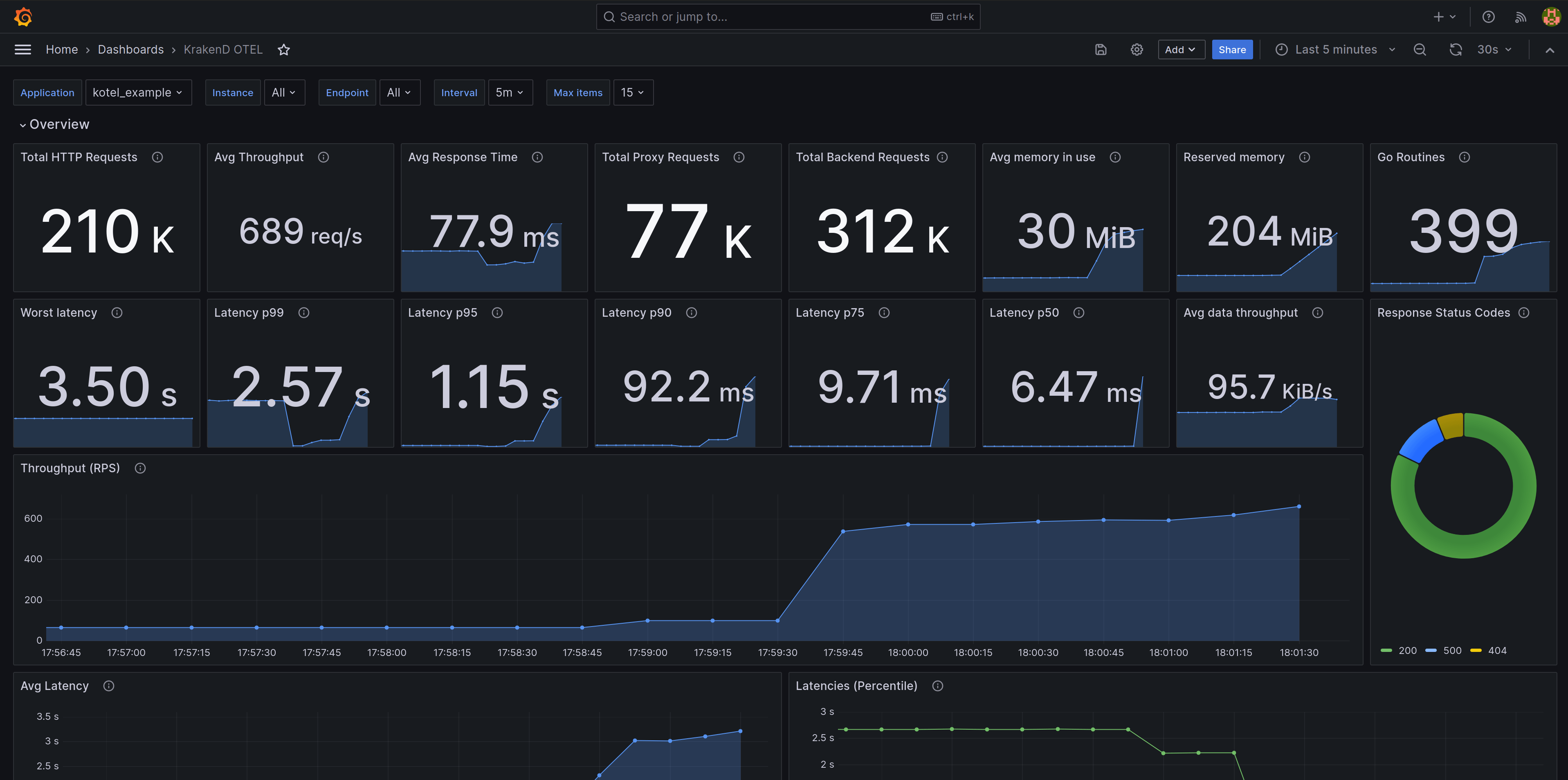Enterprise Documentation
Prometheus’ metrics endpoint
Document updated on Mar 8, 2024

About this feature
| Since | v0.5 |
|---|---|
| Namespace | telemetry/opentelemetry |
| Log prefix | [SERVICE: OpenTelemetry] |
| Scope | service |
| Source | krakend/krakend-otel |
Prometheus is an open-source system monitoring and alerting toolkit that you can use to scrap a /metrics endpoint on KrakenD in the selected port. For instance, you could have an endpoint like http://localhost:9091/metrics.
When using Prometheus with OpenTelemetry, you can use a ready-to-use Grafana dashboard to visualize metrics, as shown in the image above.
The mechanics are simple: you add the telemetry/opentelemetry integration with a prometheus exporter, and then you add a Prometheus job to scrap from your KrakenD instances the metrics.
Prometheus Configuration
To enable scrapable Prometheus metrics on Krakend, add the OpenTelemetry integration with a prometheus exporter. The following configuration is an example of how to do it:
{
"version": 3,
"extra_config": {
"telemetry/opentelemetry": {
"service_name": "krakend_prometheus_service",
"metric_reporting_period": 1,
"exporters": {
"prometheus": [
{
"name": "local_prometheus",
"port": 9090,
"process_metrics": true,
"go_metrics": true
}
]
}
}
}
}
The full list of the Prometheus exporter settings are as follows:
Fields of "telemetry/opentelemetry": { "exporters":{} }
| Set here at least the settings for one Prometheus exporter. Each exporter will start a local port that offers metrics to be pulled from KrakenD.
Each item is an object with the following properties:
|
In addition, you can do a granular configuration of the metrics you want to expose using the layers attribute and other OpenTelemetry options.
Demonstration setup
The following configuration allows you to test a complete metrics experience, from generation and collection to visualization. The first code snippet is a docker-compose.yaml that declares three different services:
- The
krakendservice exposing port 8080 - The
prometheusservice that will scrap the metrics from KrakenD - A
grafanadashboard to display them (it uses our Grafana dashboard)
Notice that the three services declare volumes to pick the configuration.
version: "3"
services:
krakend:
image: "krakend/krakend-ee:2.6.4"
ports:
- "8080:8080"
volumes:
- "./krakend:/etc/krakend/"
prometheus:
image: prom/prometheus:latest
ports:
- "9090:9090"
volumes:
- "./prometheus.yml:/etc/prometheus/prometheus.yml"
grafana:
image: grafana/grafana:latest
ports:
- "3000:3000"
environment:
GF_SECURITY_ADMIN_USER: krakend
GF_SECURITY_ADMIN_PASSWORD: krakend
GF_AUT_ANONYMOUS_ENABLED: "true"
volumes:
- "./conf/provisioning/datasources:/etc/grafana/provisioning/datasources"
- "./conf/provisioning/dashboards:/etc/grafana/provisioning/dashboards"
- "./conf/data/dashboards:/var/lib/grafana/dashboards"
The following YAML configuration is a simple example of pulling data from the /metrics endpoint in KrakenD integration from three different instances:
localhost as a target because the Prometheus container does not run inside the KrakenD container; use the service name instead.global:
scrape_interval: 15s
rule_files:
# - "first.rules"
# - "second.rules"
scrape_configs:
- job_name: krakend_otel
scrape_interval: 5s
metrics_path: '/metrics'
static_configs:
- targets:
- 'krakend1:9091'
- 'krakend2:9091'
- 'krakend3:9091'
labels:
app: kotel_example
Visualizing metrics in a dashboard
When the Prometheus configuration is added into KrakenD, and your Prometheus is scrapping it, you can visualize the data using our Grafana dashboard or make your own.
layers are disabled by default. Enable the options that matter to you, knowing that the more detail you add, the more resources the gateway will need to run.
Migrating from an old OpenCensus configuration (legacy)
Prior to KrakenD v2.6, you had to configure the Prometheus endpoint using the opencensus component. The OpenTelemetry integration is much more powerful and delivers more data while simultaneously giving you more configuration options.
If you had an OpenCensus configuration with a prometheus exporter like the following:
{
"version": 3,
"extra_config": {
"telemetry/opencensus": {
"sample_rate": 100,
"reporting_period": 0,
"exporters": {
"prometheus": {
"port": 9091,
"namespace": "krakend",
"tag_host": false,
"tag_path": true,
"tag_method": true,
"tag_statuscode": false
}
}
}
}
}
Then you should make the following changes to upgrade:
telemetry/opencensus-> Rename totelemetry/opentelemetrysample_rate-> Delete this fieldreporting_period-> Rename tometric_reporting_periodprometheus: {...}-> Add an array surrounding the object, so it becomesprometheus: [{...}]namespace-> Rename tonametag_host,tag_path,tag_method,tag_statuscode-> Delete them
From here, add any of the additional properties you can add.
